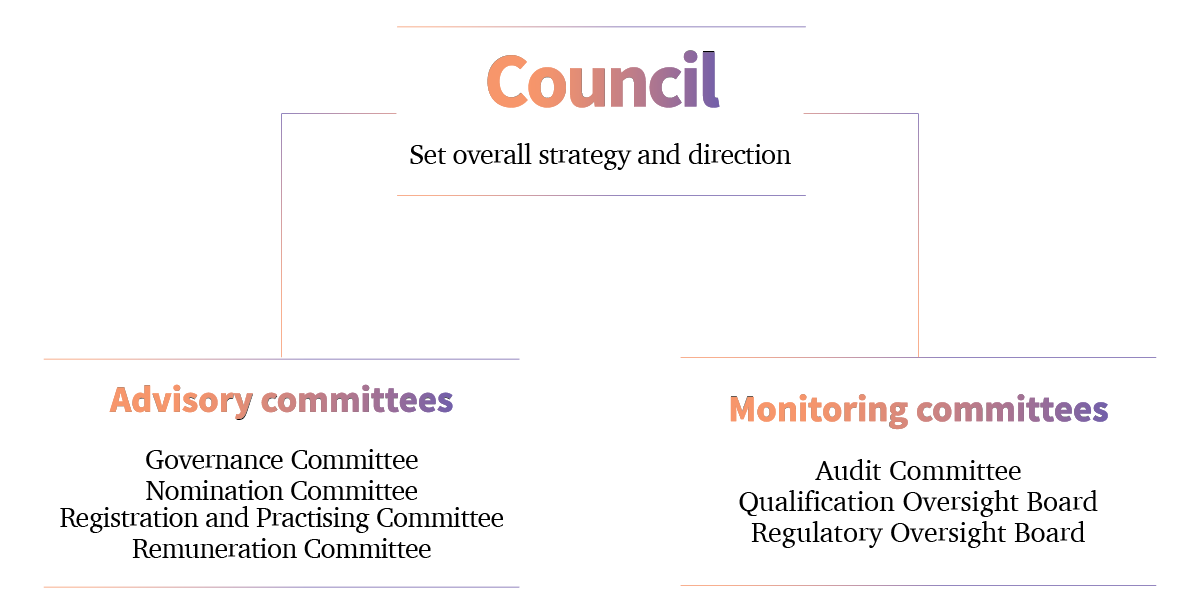Constitution, Governance and Finance
Constitution,
Governance and
Finance
InsurTech is a major area of innovation in the financial industry, and Raymond Lo (pictured here), Chief Financial Officer at FWD Hong Kong, is helping his company play a part in it. Last year, FWD Hong Kong announced its plans to invest HK$500 million in InsurTech in the next five years with a focus on three core areas: mobile services, Internet of Things, and Big Data analytics.
+
As a statutory organization, we are committed to maintaining high quality governance as well as preserving and bolstering the confidence of our members, their employers and clients, and the general public.
We regularly review our internal controls, using up-to-date technologies to increase the efficiency, security and accountability of our operations, so we can deliver to members the highest quality services.
Our staff play an important part in the success of the Institute. Therefore, it is imperative for us to create a positive working environment that attracts, retains and develops talented employees amid an increasingly competitive hiring environment. Through a balance of well-maintained operations and satisfied staff, the Institute is able to perform its functions at the highest level.

Governance
Extraordinary General Meeting
In March 2018, the Institute hosted an extraordinary general meeting after more than 100 members called for one. At the meeting, members in attendance and by proxy voted for three resolutions proposed and since the meeting, Council has been working on its response. The resolutions passed were as follows:
Resolution 1 proposed redistribution of 50% of all the cash, cash equivalent and time deposits held by the Institute to members whose names appear on the register as at 31 December 2017.
Resolution 2 called for the Institute to consider and take all necessary actions to elect president and vice-presidents through a “one member, one vote” poll from general membership of all members before the Annual General Meeting, requiring Council members to vote along the lines of the membership poll.
Resolution 3 called for the termination or non-renewal of the contract with the Chief Executive and Registrar and for the Institute to conduct global recruitment for this position and significantly reduce the remuneration of this position to a level acceptable to general membership.
In October 2017, Council began a holistic review of the fee structure. Based on the review, Council decided to introduce a membership fee waiver for 2019 and 2020 for members whose names were on the register at 31 December 2017. The fee waiver for 2019 is for the full fee (i.e. HK$2,300), and a review is planned before 2020 to determine the appropriate level of the waiver, ensuring sufficient reserves are maintained for expected operating expenses. In addition, fees for most continuing professional development seminars were reduced by 20% from 1 July 2018, non-practising certificate holder partner’s annual registration fees halved, and the eligible age for waiver of membership fee lowered to 65.
Council also considered a number of proposals to poll members for the election of president and vice-presidents. A Taskforce has been set up and considered several options proposed by the management, with the objective of holding a poll of all members under the current Council election framework. The Taskforce is examining practicality and seeking legal advice. Given the potential impact on the Professional Accountants Ordinance, amendment of the legislation is being considered in parallel.
The previous Chief Executive and Registrar left the Institute at the end of the financial year. Since that time Jonathan Ng, Executive Director, Education and Training, has been Acting Registrar. Council also set up a search committee and engaged a recruitment consultant for a global search for replacement candidates.
Governance Structure

The Council
The Council serves as the governing body of the Institute, and makes decisions on the overall strategy, policy and direction as well as matters stipulated in the Professional Accountants Ordinance. It provides guidance on the Institute’s governance and operations with the assistance of several monitoring and advisory committees.
The Council consists of 21 members this year, all of them being non-executive and non-compensated. Fourteen individuals are CPAs directly elected by the membership and the immediate past president who completed her elected term also remains on Council for an additional year to provide continuity. There are also six government appointed members to provide independent views, including two ex-officio government members and four lay members of high standing in society.
Through a balance of members from within and outside the accounting profession, the Council benefits from a wide scope of views when debating and addressing issues. All Council members follow strict rules to avoid conflict of interest, such as the forbiddance of members in taking part of discussions or decisions where a real or apparent conflict of interest is present. Council members are also not to disclose any information pertaining to their work while serving as a member of the Council.
With the exception of a break in August, Council meetings are held monthly. Attendance of individual members can be found on the Institute’s website, and abridged Council minutes in the Members’ area of the website.
Monitoring committees
Under the Council, the Institute is further guided by monitoring committees including the Audit Committee, Qualification Oversight Board and Regulatory Oversight Board. They ensure that the operations of the Institute’s management and relevant committees are aligned with the strategies and policies set by the Council.
The Audit Committee is appointed by Council and consists of five members who help Council fulfil its governance and oversight responsibilities in relation to financial reporting and internal controls. It reports directly to Council and holds regular meetings with management, and both internal and external auditors in order to effectively discharge its delegated responsibilities.
The two oversight boards are in charge of monitoring the regulations, standards and quality, and professional qualifications of the Institute. By maintaining a vigilant eye over the work of management and relevant committees, the boards are able to ensure that the Institute’s operations follow the directions provided by Council. The details of these activities are covered in respective sections of this report.
Advisory committees
Advisory committees include the Governance Committee, Nomination Committee, Remuneration Committee, and Registration and Practising Committee.
The Governance Committee is tasked with the development and review of existing policies and rules that the Institute adheres to. During the year, the Governance Committee developed guidance in relation to granting permission to disclosure of information possessed by Council members and handling of complaints addressed to Council. The Governance Committee also reviewed the respective roles of the president, vice-presidents, chief executive and the immediate past president as well as the expectations on the performance of committee chairs and members. Through recommendations to Council, the Governance Committee aims to strengthen the Institute’s standards of governance via both objectivity and efficiency.
The Nomination Committee provides recommendations to Council over the appointment of Institute members to committees, panels and working groups, the co-option of Council members and nomination of Institute representatives to take on positions in overseas bodies. It also approves, on behalf of Council, the nomination of Institute representatives to take on positions in external local bodies.
The Remuneration Committee is one of the leading forces behind the Institute’s strong management of human resources. It is responsible for providing recommendations to Council on annual pay adjustments, performance bonuses and other employment terms and conditions.
Recommendations from the Remuneration Committee and chief executive are taken into account by the Council when it decides on the overall remuneration for general staff. Decisions for individual staff are made based on documented assessments.
For the remuneration of directorate staff, Council takes into account the recommendations of the leadership team, comprising the president, vice-presidents and the chief executive, and the parameters established by the Remuneration Committee. Council members and relevant committee chairs also provide input for the performance appraisals of directorate staff.
The remuneration of the chief executive is determined on an annual performance review by Council.
The Institute seeks to attract, motivate and retain staff with the skills, experience and qualifications needed to achieve strategic and operational goals by offering remuneration packages that are competitive according to staff performance and prevailing market practices. Compensation benchmarking is performed by conducting annual salary survey with comparable organizations, which was completed in the second quarter of 2018.
The Registration and Practising Committee is a statutory committee responsible for examining the qualifications of applicants for registration as CPAs. It provides recommendations to Council as to whether to accept or reject the applicants.
In addition, it serves as an advisor to Council on applications of CPAs for practising certificates, and will conduct necessary inquiries to determine whether applicants have the qualifications needed according to the Professional Accountants Ordinance. It also advises Council on the applications of members for specialist designations and other matters as required.
Execution and finance
The chief executive takes charge in the execution of Council’s policies and decisions. Appointed by Council, the chief executive oversees the Institute’s activities and day-to-day operations, and serves as Council’s secretary and policy advisor.
The chief executive together with a management team of two executive directors, a general counsel and 12 department and section heads, direct a group of over 200 staff alongside a network of statutory and decision-making committees, as well as advisory committees and panels.
Additionally, the chief executive chairs the Executive Committee which consists of the executive directors and heads of finance and operations, legal, marketing and communications, and member support, as well as the president and two vice-presidents serving as ex-officio members. The Executive Committee holds monthly meetings to make management decisions and consider reports and recommendations to the Council.
As stated above, at the end of the financial year, the chief executive left his post. Recruitment efforts for a replacement candidate are ongoing.
At the conclusion of the financial year on 30 June 2018, the group recorded a surplus of HK$5 million. Prudent management over financial resources has allowed us to uphold a strong financial position and invest in key projects for the benefit of the profession, members and staff.
With a similar headcount to the previous financial year, the Institute further enhanced its support to members and managed another eventful year with significant changes and challenges. These included the development of the new Qualification Programme, continued enhancement of the Member Activity System, launch of the digital strategic plan, increase in the number of activities held with international and Mainland stakeholders, and formulation of the Seventh Long Range Plan.








